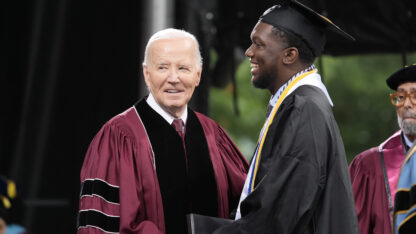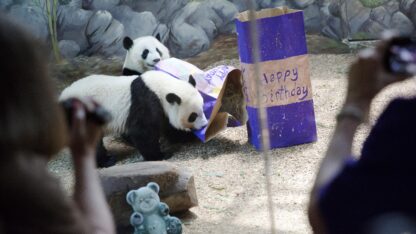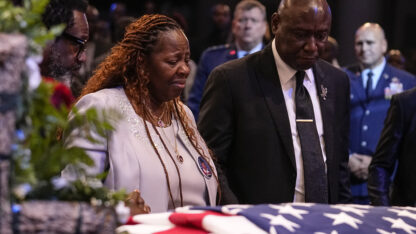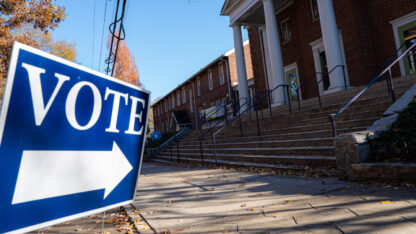VOX ATL Teen: How Youths Continue To Fight Against Prejudice In Schools, Communities

“Some call this period the new age of student activism, as many teens are forcing their voices to be heard,” VOX ATL’s Lauren Ashe writes.
Christina Norris / Courtesy of VOX ATL
By Lauren Ashe
In 2018, 59.6% of hate crimes were committed on the basis of race, ethnicity or ancestry. Another 18.7% were committed due to religious bias, and 16.7% were committed because of biases against sexual orientation.
Overall, 7,306 single-bias incidents involved 8,646 victims, according to the U.S. Department of Justice.
Though these problems are largely presented as overarching or national problems, they are happening in small communities, making their way into everyday conversations at home and school.
Because of these concerns, many teens are flocking toward activism, leading to solutions for these problems.
Activists such as 16-year-old Greta Thunberg and 20-year-old Emma González have been largely popular in the movements of climate change and gun control, two topics that have been very relevant over the last few years.
These activists are proof that teens are able to make a large impact and that their voices will be heard.
Instead of waiting for change to occur, teens have been making change happen, through attending summits, educating themselves and creating safe spaces for the marginalized, the outcasts and the excluded.
Some call this period the new age of student activism, as many teens are forcing their voices to be heard.
One example is the Anti-Defamation League’s No Place for Hate program.
Through No Place for Hate, schools are able to address hate within their communities, as well as understand aspects of combating bias and bullying. By combating these harmful aspects, schools are able to stop the escalation of hate and make learning environments feel more inviting and safe.
More than 1,600 schools across the country have joined No Place for Hate, and several schools across the Atlanta area attended their summit at Agnes Scott University on Jan. 20, engaging in small groups focused on bias and prejudice and listening to speakers such as former Democratic gubernatorial candidate Stacey Abrams.
Schools ranged from Marist High School in Atlanta, all the way to Auburn High School in Auburn, Alabama, with students and supervisors ready to commit to turning anger over hate and discrimination into something great by creating solutions to problems and further educating those who lack the knowledge.
During the summit, teen leaders played a game in which students stood when they heard a statement that applied to them.
“Stand if you’ve ever felt unsafe while at school.”
“Stand if you’ve been bullied for your race, the way you choose to wear your hair or because of sexuality.”
“Stand if you have ever heard someone be targeted because of their gender, the way they choose to wear their hair or because of their sexuality.”
Immediately, dozens of people rose, illustrating the problem that seemed to be largely common in schools for miles around.
Many teens shared their stories of classism, stereotyping, sexism, hate and injustice at their schools, whether they were a member of the LGBTQ, Jewish or African American communities.
A student from Fayette High School pointed to the fact that the majority of students who faced discrimination at her school were members of the LGBTQ community. When people use homophobic slurs, she noted that, “It is a problem, but you can’t really make people stop saying (slurs).”
Kayla Smith of Cedar Grove High School noted that “Cedar Grove is largely homogenous. The cliques are mostly among sports. The track team goes with the track team and the cheer team goes with the cheer team. There are some outsiders, though.”
The theme is common. The question is how to solve the problem.
Many teens are going about it from different viewpoints. Some choose to take their issues to the school’s administration, while others simply invite someone who is being made fun of to sit with them.
A student from the Douglas County school district mentioned her struggle with race-related biases at school, explaining that she had to take her complaints all the way to leaders of the school district, as not enough was being done at the school level.
Oftentimes, it is hard to stand up to people who may be discriminating against others. You do not really know where to start or what to do. When people seem to be in positions of power, it is often harder to stand up to them.
When discussing types of biases within their school communities, small groups examined implicit versus explicit bias, noting the unconscious nature of implicit bias and the more direct and meaningful nature of explicit bias.
Trevor Force, a student from Fayette High School, stated, “I think that one of the biggest things that need to change is people just being knowledgeable about a subject. If there’s ignorance, no true arguments can be made.”
The youth strongly believed that educating those who are not knowledgeable about the situation is crucial, as sometimes it may just be the fact that people do not know what they are saying is hurtful, offensive or makes others feel bad.
Through kind talks, informing the ignorant and helping people to understand, teens are looking at ways to educate people and move forward rather than moving 10 steps backward.
Oftentimes, students have been called to take action into their own hands as well, as the school district or administration has done little to nothing to shed light on situations that harm many people.
Later in the day, students had the opportunity to listen to keynote speaker Abrams, a New York Times best-selling author, social entrepreneur, nonprofit CEO, political leader and the first black woman to become the gubernatorial nominee for a major party.
During her speech, Abrams highlighted the prejudice that she once faced as a young African American woman. She told the story of when she was denied entry to the governor’s mansion, though her name was on the list and she was a valedictorian waiting to be celebrated.
Despite this, she continued to work hard and tackle prejudices within her own life, encouraging the crowd of eager teens to continue to be activists and rally behind what they believe in.
Abrams also discussed the fact that teens can be instrumental in progress, further noting the importance of believing in each other, investing in each other and taking action in situations.
After speaking, Abrams opened up the floor to a Q&A, leading students to ask her questions about making a difference and fighting prejudice within their communities.
A student named Jack from Marist High School asked, “A lot of social change has been going on at our school, for better or for worse, and a lot of students do not seem to be on board with it. How do I get them on board with this change?”
Abrams stated, “Before change is made, make sure other people understand why change is needed. The first step to creating change is making sure people understand what the problem is, but then, why it is a problem. It’s not enough to say, ‘This is wrong,’ you’ve got to say why this is wrong and why it matters.”
When committing deeds of activism, teens may look toward this advice to know that their voice matters and will ultimately be heard. Teens are largely working on being allies and helping the marginalized groups of society.
Through this generation of teen activism all over the world, change will be made.
Lauren, 16, is a junior at St.Pius X Catholic High School. She is a varsity cheerleader, runs track and swims. She loves music and enjoys photo taking in her free time!
This story was published at VOXATL.org, Atlanta’s home for uncensored teen publishing and self-expression. For more about the nonprofit VOX, visit www.voxatl.org.





